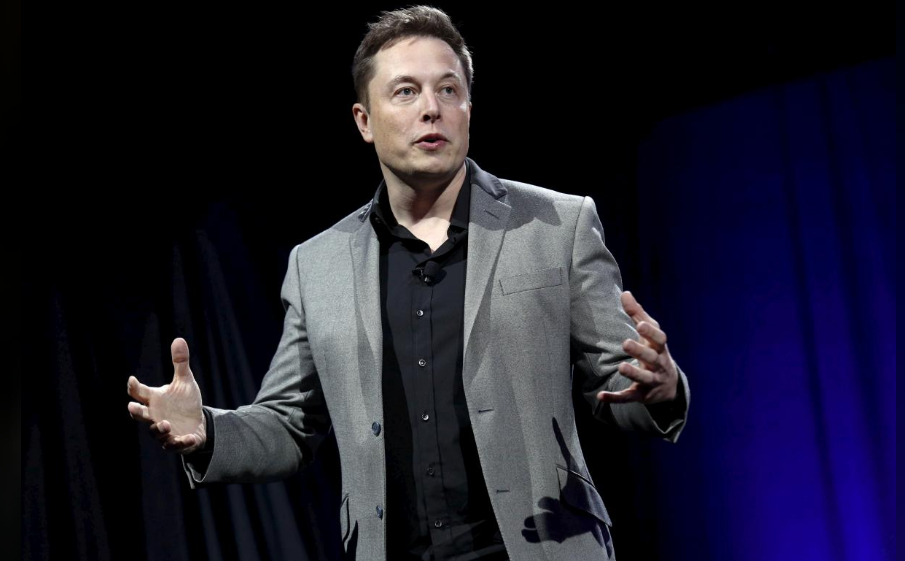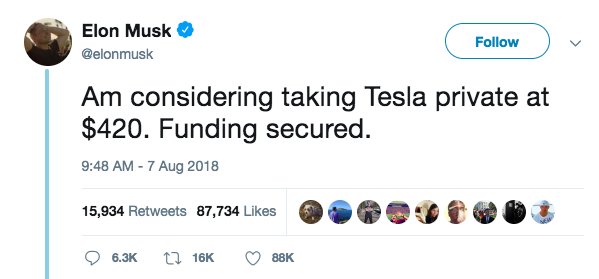US regulator sues Musk for fraud, seek to remove him from Tesla

NEW YORK/SAN FRANCISCO - The top US securities regulator on Thursday accused Tesla Inc Chief Executive Elon Musk of fraud and sought to remove him from his role in charge of the electric car company, saying he made a series of "false and misleading" tweets about potentially taking Tesla private last month.

Musk, 47, is one of the highest-profile tech executives to be accused of fraud by the Securities and Exchange Commission (SEC). Losing its public face and guiding force would be a big blow for money-losing Tesla, which has a market value of more than $50 billion, chiefly because of investors' belief in Musk's leadership.
The Department of Justice, which has the authority to press criminal charges, has also questioned the company about Musk's tweets, the company said this month.
Tesla shares tumbled 12 percent in after-hours trading.
"Elon is Tesla and Tesla is Elon and that's great when Elon is scoring touchdowns and grand slams but not so great when there are negative things tied to him," said Karl Brauer, executive publisher at car research firm Kelley Blue Book.
"I don't know how you spin an SEC lawsuit that seeks to remove you from leadership of your own company."
Musk said he had done nothing wrong. "This unjustified action by the SEC leaves me deeply saddened and disappointed," he said in a statement. "I have always taken action in the best interests of truth, transparency and investors. Integrity is the most important value in my life and the facts will show I never compromised this in any way."
The SEC's lawsuit, filed in Manhattan federal court, caps a tumultuous two months set in motion on Aug. 7 when Musk told his more than 22 million Twitter followers that he might take Tesla private at $420 per share, with "funding secured."
On Aug. 24, after news of the SEC probe had become known, Musk blogged https://www.tesla.com/blog/staying-public that Tesla would remain public, citing investor resistance.
The Wall Street Journal reported on Thursday that the SEC filed the lawsuit after a proposed settlement with Musk fell apart. The SEC did not immediately respond to a request for comment late on Thursday.
In its lawsuit, the SEC said Musk calculated the $420 price per share based on a 20 percent premium over that day’s closing share price and because of the number's slang reference to marijuana. The lawsuit, which cites emails and text messages between Musk and Tesla executives, quoted Musk as saying he thought his girlfriend "would find it funny."
Musk had not discussed the $420 figure with any potential funding source before he broached the subject to Tesla's board in an Aug. 2 email, the SEC said.
In comments provided to CNBC, Tesla said Musk did not approach the deal as a typical take-private transaction.
The move to bar Musk as an officer of any public company was a rare move for the SEC against the CEO of such a well-known firm.
“The lesson for CEOs is that the rules apply to everyone including highly successful visionaries,” said Charles Elson, director of the Weinberg Center for Corporate Governance at the University of Delaware.
Teresa Goody, CEO of law firm Goody Counsel and a former SEC attorney, said the SEC had acted quickly but that most such SEC lawsuits are usually settled without going to a jury trial.
Settlements can take some time to reach if the defendant is unwilling to budge on the SEC’s key demands.
“The SEC seeking an officer and director bar magnifies the consequences for Musk and strengthens the SEC’s position in potential future settlement negotiations,” said Goody.

